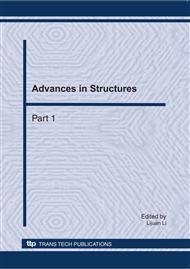p.3180
p.3186
p.3193
p.3200
p.3206
p.3210
p.3214
p.3219
p.3223
The Effects of Carbonation on Damping Capacity of Reinforced Concrete Materials
Abstract:
Carbonation of cementitious materials results in a reduction of the pH value which makes the material less alkaline and leads to unsightly spalling on structures. In this paper, the experimental investigation on damping capacity of reinforced concrete materials and members with carbonization at different ages was carried out by the method of 3-point bending beam damping measurement and cantilever beam free vibration respectively. The experimental results show that loss tangent and loss modulus were all decreased by carbonization. It shows that the damping capacity is decreased by carbonation corrosions with the carbonation time increase. It is indicated that the effects of carbonation-induced corrosion on the damping capacity for engineering materials and structures are absolutely essential.
Info:
Periodical:
Pages:
3206-3209
Citation:
Online since:
December 2010
Authors:
Keywords:
Price:
Сopyright:
© 2011 Trans Tech Publications Ltd. All Rights Reserved
Share:
Citation:


